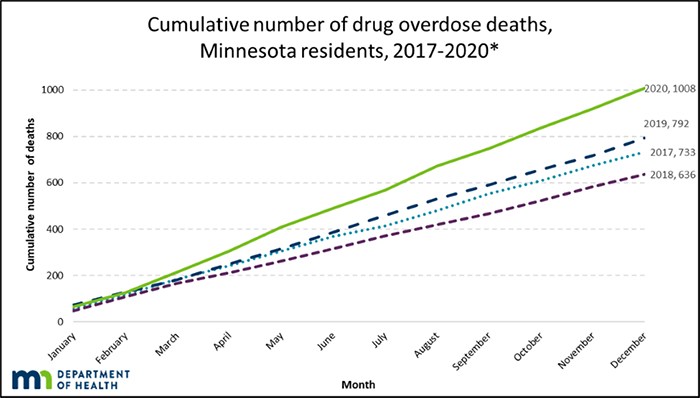News Release
May 3, 2021
Preventable deaths by overdose increase dramatically during COVID-19 pandemic
The Minnesota Department of Health (MDH) reported an increase of 27% in drug overdose deaths from 2019 to 2020, going from 792 Minnesotans dying from an overdose in 2019 to 1,008 dying from an overdose in 2020. The trend shows each month in 2020 had a higher number of overdose deaths than the same month the year before.
The number of drug overdose deaths in 2020 is higher when compared to 2017-2019

Opioid overdose deaths
Preliminary data show a 59% increase from 2019 to 2020 for all opioid-involved deaths among Minnesota residents (412 to 654 deaths). Deaths involving synthetic opioids, including fentanyl and fentanyl analogues, increased 81% (298 to 539 deaths), and were involved in 82% of all opioid-involved deaths. Deaths involving commonly prescribed opioids, such as hydrocodone (Vicodin), oxycodone (Percocet), morphine and methadone, increased 53% (135 to 207 deaths). Deaths involving heroin increased 15% (102 to 117 deaths). The increase in deaths from substances of commonly prescribed opioids is a reversal of recent progress, where these deaths declined in both 2018 and 2019.
“Minnesota families are struggling, and the overdose deaths in 2020 are a terrible reminder that those struggles can result in preventable deaths,” said Minnesota Commissioner of Health Jan Malcolm. “The year has been unprecedented in so many ways, and the staggering number of drug overdose deaths shows the need to amplify our prevention efforts and strengthen the ability of communities to support people and connect them with services.”
Non-opioid drug overdose deaths
Preliminary data also show a large increase in deaths involving non-opioids from 2019 to 2020. Psychostimulant-involved deaths, which includes methamphetamine, increased 44%, (229 to 329 deaths), deaths involving benzodiazepines increased 70% (83 to 141 deaths) and deaths involving cocaine increased 41% (58 to 82 deaths).
“The last year has been incredibly challenging and demonstrates the need for increased public health measures,” said Dana Farley, MDH drug overdose prevention supervisor. “Prevention tools such as access to naloxone, linkages to care and overdose fatality reviews improve our understanding of why people are using drugs and lead to recovery and saved lives.”
Support and resources are available. Pick up the phone or connect using a video platform and reach out to your community, however that looks for you. A list of recovery resources can be found at Support for Addiction Recovery during COVID-19.
Read the Preliminary Drug Overdose Deaths During the COVID-19 Pandemic in 2020 (PDF) (link expired) on the MDH Drug Overdose Dashboard. Visit the Drug Overdose Dashboard to learn more about overdose data, opioid emergency response, lifesaving naloxone and preventing the demand for drugs.
The Minnesota Department of Health (MDH) also launched a new podcast series “Stories from the Field,” earlier this month, aimed at addressing the evolving opioid epidemic. To listen to the podcast series, visit Opioids: Prevention, Treatment and Community-Driven Efforts.
-MDH-
Media inquiries:
Julie Bartkey
MDH Communications
612-759-0499
julie.bartkey@state.mn.us
This work is supported by Cooperative Agreement Number NU17CE2019001983 from the Centers for Disease Control and Prevention. Its contents are solely the responsibility of the authors and do not necessarily represent the official views of the Centers for Disease Control and Prevention.